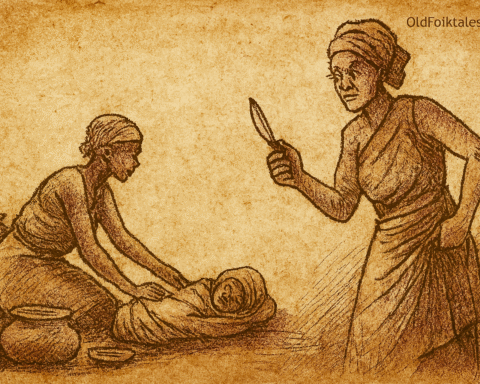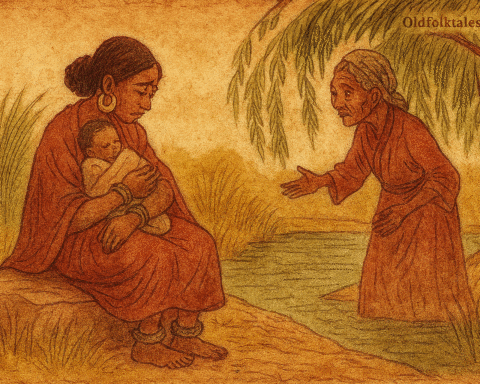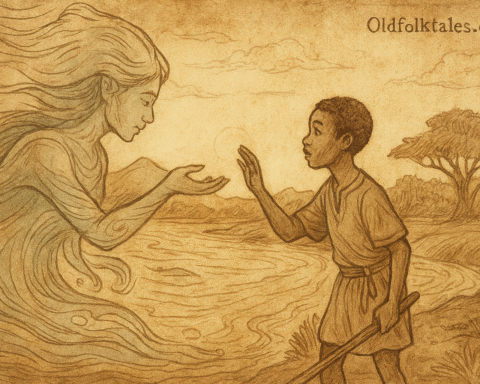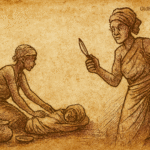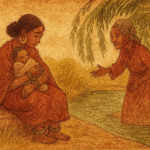When the hunter saw the two-mouthed thing he cried “Chiyovo” “unlucky”, and his life left him before anyone could grasp what had happened.
He had walked since dawn, following faint spoor and listening to the whisper of grass. The bush was hot, the plane trees shading the path like scattered umbrellas. Tired, he sat upon a flat rock and noticed a pale stick glittering ahead. Curious, he rose and drew near. The object lay doubled upon itself like a strange reed; each end formed a small mouth that opened and closed as if breathing. The hunter startled and, without meaning to, spoke aloud the Luchazi word that named misfortune.
At that single syllable the thing uncoiled like a secret waking. The hunter’s face lost its colour; his knees bent; he staggered and fell silent. His dog, faithful shadow since puppyhood, leapt from its coil and nosed his master. The animal whined, prodded him, barked and then, as if knowing more than human hearts, ran for the village with a strange urgency. Before the widow had set the pot, the dog had returned to the door and scratched until she followed, bewildered and afraid.
News moved like smoke: the hunter had gone. The widow and neighbours trailed the dog across the familiar footpaths until they reached the clearing. There the hunter lay still, his spear beside him, the two-mouthed thing coiled where he had knelt. The widow’s cry broke the morning, sharp and raw, and those nearest bowed their heads as if the sky itself might strike them for looking too long. A witch-doctor came at once, stones and leaves rattling in his bundle, and peered at the curious thing with a blend of dread and curiosity.
READ: The Bell That Outwitted the Lion: A Kaonde Folktale from Zambia
“Speak not of wonder,” the old man warned the gathered crowd. He slapped his knee and called an owl from a hollow tree; the bird answered with a hollow calling that seemed to press on their chests. “That beast, if beast it be, feasts upon surprise. To cry ‘Chiyovo’ or to gasp is to give it strength. Keep calm. Keep silence.” The widow trembled, hands clenched until her nails bit her palms, and the men set to work. With axes and stout rope, they cut creepers and woven baskets until a rough coffin formed; all the while they kept their faces as still as closed shells.
They wrapped the hunter in white calico and laid him into the basket that would be his bier. The witch-doctor planted fragrant herbs and muttered prayers. The dog sat solemn by the pile of earth and would not be coaxed to eat. As the procession moved, the small creature remained where it had been, unspeaking and strangely patient, watched by eyes that did not blink. The river lay ahead, a silver thread through the bush, and the elders spoke of rites: wash with three herbs, whisper the name once, set the bier afloat and let the current take it.
At the riverbank they performed the ritual, speaking the hunter’s name only once, after which the coffin was set upon the water. It drifted beneath leaning reeds and out of sight. The dog nosed the bank until the bier slid free of view; then it returned to the plane tree where the strange thing had lain. No one dared touch that soft coil that day. They burned leaves to fumigate the place and sang low songs to steady their hearts. The witch-doctor warned all who would listen: “A name given grants passage; a name cried gives hunger. Guard your lips.”
The widow stayed close to the hut that night, the dog at her feet, the empty spear by the hearth. Children peered in and asked questions; elders answered with the smallest words, for they had learned the power of a quiet face. Weeks passed; the villagers returned to their fields, but the story remained a kind of watch. Where the two-mouthed thing had lain, a patch of grass stayed grey and quiet. Parents used the tale to hush reckless speech: “Do not cry surprise at every oddity,” they would say; “never name what has not been asked for.”
In time the tale of the hunter and the double-mouthed thing travelled beyond that hamlet, told beside fires and at market stalls in the Luchazi tongue. It became a caution folded into everyday words: that a careless cry can change a life, and that sometimes survival depends on measured lips and steady faces. The hunter’s bier drifted on the river; the dog kept watch by the plane tree for many seasons, a quiet sentinel reminding the people that some surprises are best left unnamed.
Moral Lesson
Words can be as powerful as spears. A careless exclamation can feed what should remain unknown; measured speech and composed behaviour protect a community from forces it does not understand. The Luchazi teach that restraint is not timidity but preservation.
Guard your tongue and your wonder: speak the names you are allowed to speak, and keep silence where the elders warn. Respect story and ritual, they preserve the balance between the seen and the unseen.
Knowledge Check
- Q: Who died upon discovering the two-mouthed thing?
A: A hunter found the two-mouthed creature and died instantly after uttering “Chiyovo.” - Q: What does the word Chiyovo mean and what language is it from?
A: Chiyovo means “unlucky” or “misfortune” and is a Luchazi word from Zambia. - Q: What role did the dog play in the Luchazi tale?
A: The dog led villagers to the hunter, stayed faithful at the hut, and acted as a guide in the ritual burial. - Q: What cultural lesson does this Luchazi folktale emphasize?
A: It warns against careless speech and surprises, teaching restraint, ritual respect, and community caution. - Q: How was the hunter’s body disposed of according to the story?
A: Villagers performed rites, wrapped him, placed him in a woven coffin, and set it afloat on the river after speaking his name once. - Q: Why should listeners in the tale avoid expressing astonishment?
A: In the folktale, vocal surprise feeds the strange creature; silence is the community’s protection against harm.
Folktale Origin
Source: Luchazi folktale, Zambia. Collected in Folktales of Zambia (see: Chiman L. Vyas, comp., “Folktales of Zambia” collection).


